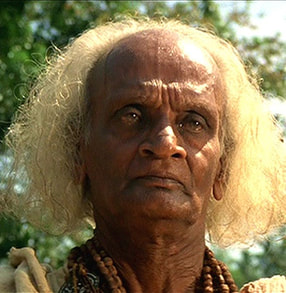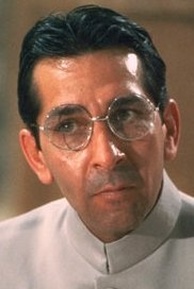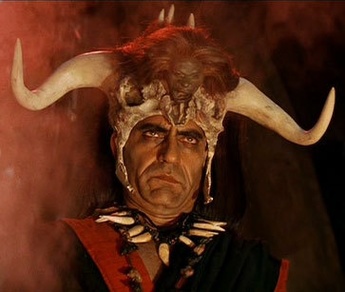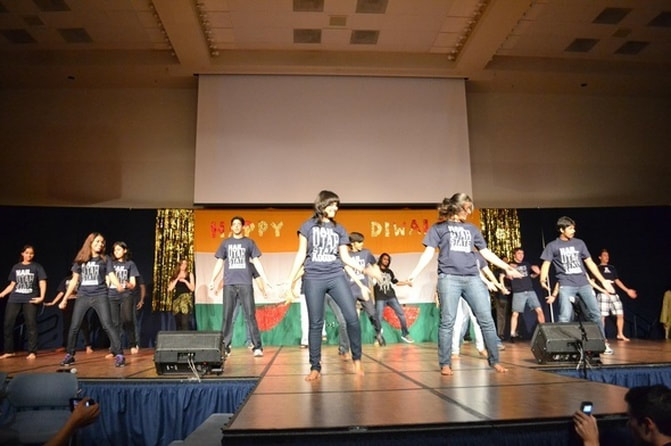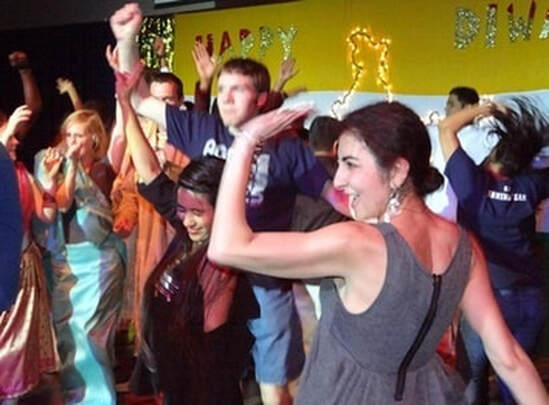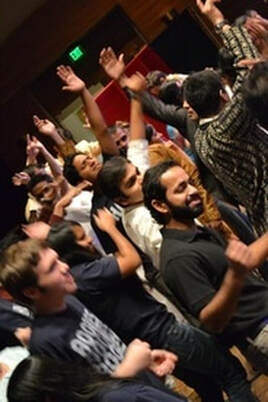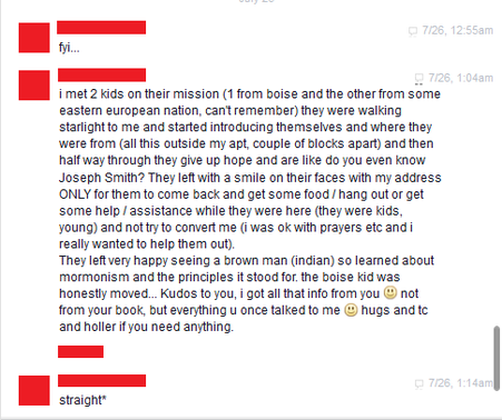Why I Love India
There was very little diversity in upstate New York. I encountered only two Indians in my first eighteen years of life - a housewife who answered the door during a bottle drive for Scouts, and my pediatrician Dr. Iqbal. So naturally most of my exposure to Indian culture was through popular culture. After various versions of "The Jungle Book", the first Indian character I became very familiar with was Apu Nahasapeemapetilon from "The Simpsons". Years later this character would become controversial and be accused of perpetuating inaccurate and dated stereotypes. These are legitimate points, but I will just say that in my personal experience, I don't feel that he caused me to view Indians in a negative or one-dimensional light. If anything, he seemed smarter than most of the bumbling dolts on that show, such as in the episode "Much Apu About Nothing" where he takes a test to gain American citizenship.
Proctor: All right, here's your last question. What was the cause of the Civil War?
Apu: Actually, there were numerous causes. Aside from the obvious schism between the abolitionists and the anti-abolitionists, there were economic factors, both domestic and inter-
Proctor: Wait, wait... just say slavery.
Apu: Slavery it is, sir.
As a teenager I became an Indiana Jones fanatic and watched "Indiana Jones and the Temple of Doom" several times. Though based on true aspects of India's history (the murderous Kali-worshiping Thuggee cult really existed) it sensationalized and distorted them for shock value (they didn't actually pull out beating hearts with their bare hands). I understand that some aspects of the movie haven't aged well, but I don't understand claims that it "misrepresents Hinduism" when the villains are explicitly not Hindus. The novelization by James Kahn is somewhat more fleshed out and informative about actual Indian culture. The village of Mayapore, the rope bridge and a few other settings were actually filmed in Sri Lanka with the shaman Marhan and other villagers portrayed by Sri Lankan natives.
Proctor: All right, here's your last question. What was the cause of the Civil War?
Apu: Actually, there were numerous causes. Aside from the obvious schism between the abolitionists and the anti-abolitionists, there were economic factors, both domestic and inter-
Proctor: Wait, wait... just say slavery.
Apu: Slavery it is, sir.
As a teenager I became an Indiana Jones fanatic and watched "Indiana Jones and the Temple of Doom" several times. Though based on true aspects of India's history (the murderous Kali-worshiping Thuggee cult really existed) it sensationalized and distorted them for shock value (they didn't actually pull out beating hearts with their bare hands). I understand that some aspects of the movie haven't aged well, but I don't understand claims that it "misrepresents Hinduism" when the villains are explicitly not Hindus. The novelization by James Kahn is somewhat more fleshed out and informative about actual Indian culture. The village of Mayapore, the rope bridge and a few other settings were actually filmed in Sri Lanka with the shaman Marhan and other villagers portrayed by Sri Lankan natives.
"Temple of Doom" was hugely influenced by the classic film "Gunga Din", loosely based on the Rudyard Kipling poem of the same name. I watched that too and it became one of my all-time favorites. Though at times less than flawless in its portrayal of India, it impressed me that the white protagonists are total goofballs most of the time and Gunga Din is the real hero of the film.
I also devoured the Tintin adventure "Cigars of the Pharaoh", where the intrepid reporter finds himself in India where he faces a sinister mental institution, a wicked fakir with supernatural powers, and an underground secret society resembling the Ku Klux Klan. He must protect the Maharajah of Gaipajama from the poison of madness, rajaijah juice, and unmask a ring of opium smugglers while avoiding the Thompson twins who are mistakenly trying to arrest him. While not quite showing the cultural awareness that developed with Chinese people in the next book, "The Blue Lotus", Hergé's treatment of Indians avoided the stereotypes that marred his earlier portrayals of Congolese and Native Americans. Although they do try to sacrifice Tintin's dog, Snowy, to Shiva for fighting with a sacred cow.
My first opportunity to see a portrayal of India by Indians was the Bollywood movie "Bride and Prejudice". It's obviously based on the similarly titled Jane Austen novel, but guess which one is more interesting? Hint: the characters in this movie talk like normal people and also sing. The catchiest song is "No Life Without Wife", shown below (warning: it has a risque bit). The best line is either "You Americans think you've got this whole marriage thing figured out. Pretty arrogant, considering you've got the highest divorce rate in the world" or "These girls are like naked live wires. If you touch one you'll get an electric shock of love".
I also devoured the Tintin adventure "Cigars of the Pharaoh", where the intrepid reporter finds himself in India where he faces a sinister mental institution, a wicked fakir with supernatural powers, and an underground secret society resembling the Ku Klux Klan. He must protect the Maharajah of Gaipajama from the poison of madness, rajaijah juice, and unmask a ring of opium smugglers while avoiding the Thompson twins who are mistakenly trying to arrest him. While not quite showing the cultural awareness that developed with Chinese people in the next book, "The Blue Lotus", Hergé's treatment of Indians avoided the stereotypes that marred his earlier portrayals of Congolese and Native Americans. Although they do try to sacrifice Tintin's dog, Snowy, to Shiva for fighting with a sacred cow.
My first opportunity to see a portrayal of India by Indians was the Bollywood movie "Bride and Prejudice". It's obviously based on the similarly titled Jane Austen novel, but guess which one is more interesting? Hint: the characters in this movie talk like normal people and also sing. The catchiest song is "No Life Without Wife", shown below (warning: it has a risque bit). The best line is either "You Americans think you've got this whole marriage thing figured out. Pretty arrogant, considering you've got the highest divorce rate in the world" or "These girls are like naked live wires. If you touch one you'll get an electric shock of love".
Lalita, you'll never find a man who fits all those criteria, so you may as well settle for me.
Ironically enough, and perhaps to the shame of the American education system, the first time I ever heard of Mahatma Gandhi was in a clip of the following scene from the "Weird Al" Yankovic movie UHF. The movie is about a failing TV station that daydreamer George Newman inherits from his uncle and revitalizes with a bunch of weird and ground-breaking new programs. This was one of them, intended to satirize the trend of movie sequels being more action-oriented than their predecessors. It took me much longer than it should have to realize that Gandhi was portrayed by Al himself in brownface, and that portraying him in this manner at all would be offensive to many Indians. This movie was made in 1989 so I hope we can forgive it.
Ironically enough, and perhaps to the shame of the American education system, the first time I ever heard of Mahatma Gandhi was in a clip of the following scene from the "Weird Al" Yankovic movie UHF. The movie is about a failing TV station that daydreamer George Newman inherits from his uncle and revitalizes with a bunch of weird and ground-breaking new programs. This was one of them, intended to satirize the trend of movie sequels being more action-oriented than their predecessors. It took me much longer than it should have to realize that Gandhi was portrayed by Al himself in brownface, and that portraying him in this manner at all would be offensive to many Indians. This movie was made in 1989 so I hope we can forgive it.
Sadly, one of my favorite Gandhi quotes - "I like your Christ. I do not like your Christians. They are so unlike your Christ" - turns out to probably not be authentic, although a few contemporary sources claim he said something similar. I like the quote so much I'm going to just pretend he said it anyway.
Even more ironically, my first real exposure to Indian culture happened in Utah. In July 2011 I moved into Snow Crest, the small apartment complex that my mother had managed to arrange after I procrastinated finding one until it was almost too late. My roommates were white and the guys next door were white and Polynesian, but everyone else in the complex, and the friends they had over, were Indians. I confess that my first impression was annoyance because they played their music too loud at night and I was too spineless to talk to them about it. But I moved into an empty room farther away from where they congregated and then I was fine. I had to sympathize with them, of course, because they had come from huge cities and naturally got very bored in a town of 50,000 people.
In church I wrote myself a goal to make friends with these people I had initially found annoying. I didn't have an actual plan to do so, because I kept to myself and didn't go around making friends. But one night as I was coming home from something, one of them was hanging around outside, and he said hi and introduced himself. His name was Ashish. After that things escalated and I met Ashwin ("You know Ashton Kutcher? My name's like his, but with a w"), his girlfriend Pooja, and Swadesh. I met some of the others too, but I had difficulty remembering all their names, because they were names I'd never heard before. One silent girl always kind of looked like she wanted to stab me, but when I shared this concern with Ashish he just laughed and said not to worry about it. I'm still alive, so I guess he was right.
These men and women, to my knowledge, were all Masters students in fancy things like engineering and computer science, thousands of miles from the country where they'd grown up. I was an 18-year-old idiot with zero experience at adulting. But they treated me like the coolest person on the planet.
Even more ironically, my first real exposure to Indian culture happened in Utah. In July 2011 I moved into Snow Crest, the small apartment complex that my mother had managed to arrange after I procrastinated finding one until it was almost too late. My roommates were white and the guys next door were white and Polynesian, but everyone else in the complex, and the friends they had over, were Indians. I confess that my first impression was annoyance because they played their music too loud at night and I was too spineless to talk to them about it. But I moved into an empty room farther away from where they congregated and then I was fine. I had to sympathize with them, of course, because they had come from huge cities and naturally got very bored in a town of 50,000 people.
In church I wrote myself a goal to make friends with these people I had initially found annoying. I didn't have an actual plan to do so, because I kept to myself and didn't go around making friends. But one night as I was coming home from something, one of them was hanging around outside, and he said hi and introduced himself. His name was Ashish. After that things escalated and I met Ashwin ("You know Ashton Kutcher? My name's like his, but with a w"), his girlfriend Pooja, and Swadesh. I met some of the others too, but I had difficulty remembering all their names, because they were names I'd never heard before. One silent girl always kind of looked like she wanted to stab me, but when I shared this concern with Ashish he just laughed and said not to worry about it. I'm still alive, so I guess he was right.
These men and women, to my knowledge, were all Masters students in fancy things like engineering and computer science, thousands of miles from the country where they'd grown up. I was an 18-year-old idiot with zero experience at adulting. But they treated me like the coolest person on the planet.
One night I walked to the grocery store with Ashwin and Pooja, and the subject somehow turned to religion. At the time I was LDS. Ashwin pointed out the LDS Church's beautiful Logan Temple, which was closed for cleaning at the time, and asked if they could go inside it when it reopened. "Only members can go in," I said, feeling a bit guilty. "Sorry."
"Don't be sorry," he said quickly. "I was just wondering." I tried to explain something of the purpose of temples, and I told him I was sure there would be one in India someday, but there were just too few members to justify it yet, and he nodded. Then he had some more questions. He asked about "John Smith" the Prophet. I told him it was "Joseph Smith" and then he was the one apologizing, as if he'd said something offensive. He recounted the beginning story of the Book of Mormon, the story of Lehi and Nephi - his account was somewhat garbled, but I was impressed with how much he knew. Then he asked, "Don't you guys believe you can become gods someday?"
That's a controversial doctrine and not the first thing Latter-day Saints like to teach nonmembers, but I wasn't going to sidestep a direct question. So I said "Yes".
"That's beautiful, man," he said, looking and sounding genuinely touched. "That's beautiful."
At this time I was paranoid about anti-Mormonism and the effect it could have on people, so at times during the conversation I would bring up and defuse criticisms in anticipation of him running into them sooner or later, saying "Some people say such-and-such about us, but the truth is such-and-such."
But he wasn't the slightest bit interested in talking about that. "Oh, those people are probably just, critics," he said. And that taught me a valuable lesson; most people really don't care what they have to say. Take that, critics.
In the interest of fairness, when that topic died down I started asking questions about Hinduism. They seemed impressed by me knowing the names of a few Hindu gods and goddesses, and when the subject broadened to India in general they were impressed that I knew the national language was Hindi. Ashwin once introduced me to a friend by saying "Dude, this kid knows a frickin' lot about India". I was puzzled but flattered by this sort of response to my very limited knowledge.
Ashwin, and I think Pooja, were the spiritual-but-not-religious types. They believed in God and respected all religions. I thought it would be neat if they converted to mine, but soon decided I didn't care whether they did or not, because they were the most open-minded and respectful people I'd ever met. When they praised my religion they were sincere and not just paying lip service to oft-abused maxims of "tolerance." I was grateful when the Brigham City Temple was completed ahead of schedule, enabling them to tour it during the open house before Pooja moved to Idaho. Their wish to see a temple's interior was fulfilled. Also, once I gave Ashwin a Book of Mormon and he asked excitedly, not "I can keep this?" but "I can read this?" That amused me because the LDS Church wants everyone to read it.
We discussed religion on a few other occasions and once in a while some of their other friends got involved. One guy asked me "Why do you believe Jews are children of the devil?" That was weird. (Latter-day Saints don't believe that.) But I found Ashwin's and Pooja's same level of respect from other Indians consistently over the years, whether they were Hindu, Catholic, LDS, or atheist.
When school started I moved into on-campus housing. Sometime in October, while riding my roommate's bike to the Ellen Eccles Theater to watch "The Jazz Singer" for Michael Ballam's Creative Arts course, I wiped out and broke a bone in my thumb into five pieces. I didn't know that at the time; I just knew that it hurt a lot and that my hands were covered in blood and would need to be washed off. Fortunately Snow Crest was less than a block away, and I knew I could solicit one of my old friends for the use of his sink. The only catch was that I didn't want any sympathy or "Oh no, what happened?" kind of stuff. I just wanted to get in, wash my hands, and get out. But that wasn't an option, so I swallowed my pride and went and knocked on one of the doors. Ashish was home and he let me in.
I happened to be wearing my shirt (now ruined) with a deer in crosshairs and the words "Vegetables are not food - vegetables are what food eats!" Since Ashish was a vegetarian and I was coming to his apartment and soliciting his aid, I felt kind of guilty. But apparently Indian vegetarians aren't judgmental and self-righteous like American ones, because he didn't care at all even when I mentioned it. He let me in and let me use his sink and got me iodine and bandages and stuff. About then I got woozy and almost collapsed, and that's when I realized this was a bigger deal than I'd thought. So he brought me water and rice and I rested on his couch for an hour while some friends came over to rehearse a musical number for a Hindu festival called Diwali, where he would be one of the MCs.
Diwali is often known as the "festival of lights" because it involves lighting small clay lamps filled with oil, both to represent the triumph of good over evil and to welcome the goddess Lakshmi. Firecrackers are set off to repel evil spirits, and everyone wears new clothes and exchanges treats. For the Indian Student Association at USU, it also involved putting on a talent show of sorts, with singing and dancing and audience-participation games. A few years later I went to a more traditional ceremony at the Krishna Temple in Salt Lake, but I liked this one better, largely because I was in it.
A few days later I was in the Taggart Student Center when I ran into Ashwin and followed him to the ballroom, where he, Pooja, Ashish, and several Indians I hadn't met were practicing a song-and-dance number for Diwali. I watched them on the stage and tried to mirror their moves just for fun, because it was an awesome song and I still didn't know my thumb bone was broken. As we were leaving for the night the girl in charge of it, Anitha (the h is silent), asked me if I would like to actually be in the performance. I couldn't believe she was serious, but I gladly accepted. I had about three days to memorize the dance. During this time I met Bhaswati, Ritu, Swathi, Arévik (who was Armenian), Samruddh, and Susheel.
Anitha assigned another white guy who was in it - a burly guy named Thomas who called himself "Jessica" and wore shorts in winter - to teach me. I'm not good at memorizing physical movements, and I'm not good at coordinating two limbs at once, and my two years of dance class in New York were already a distant memory. But I managed all right even if I was a little slow. The night of Diwali soon arrived and we - by which I mean mostly the Indians and some white people with a modicum of help from me - brought the house down with our finale, Salaam-E-Ishq (Salute to Love), which is one of the best songs in the freaking universe. This is a video recording of that event. (It also has a risque bit, but not nearly as disturbing as the previous.) I'm the guy in the black jacket.
"Don't be sorry," he said quickly. "I was just wondering." I tried to explain something of the purpose of temples, and I told him I was sure there would be one in India someday, but there were just too few members to justify it yet, and he nodded. Then he had some more questions. He asked about "John Smith" the Prophet. I told him it was "Joseph Smith" and then he was the one apologizing, as if he'd said something offensive. He recounted the beginning story of the Book of Mormon, the story of Lehi and Nephi - his account was somewhat garbled, but I was impressed with how much he knew. Then he asked, "Don't you guys believe you can become gods someday?"
That's a controversial doctrine and not the first thing Latter-day Saints like to teach nonmembers, but I wasn't going to sidestep a direct question. So I said "Yes".
"That's beautiful, man," he said, looking and sounding genuinely touched. "That's beautiful."
At this time I was paranoid about anti-Mormonism and the effect it could have on people, so at times during the conversation I would bring up and defuse criticisms in anticipation of him running into them sooner or later, saying "Some people say such-and-such about us, but the truth is such-and-such."
But he wasn't the slightest bit interested in talking about that. "Oh, those people are probably just, critics," he said. And that taught me a valuable lesson; most people really don't care what they have to say. Take that, critics.
In the interest of fairness, when that topic died down I started asking questions about Hinduism. They seemed impressed by me knowing the names of a few Hindu gods and goddesses, and when the subject broadened to India in general they were impressed that I knew the national language was Hindi. Ashwin once introduced me to a friend by saying "Dude, this kid knows a frickin' lot about India". I was puzzled but flattered by this sort of response to my very limited knowledge.
Ashwin, and I think Pooja, were the spiritual-but-not-religious types. They believed in God and respected all religions. I thought it would be neat if they converted to mine, but soon decided I didn't care whether they did or not, because they were the most open-minded and respectful people I'd ever met. When they praised my religion they were sincere and not just paying lip service to oft-abused maxims of "tolerance." I was grateful when the Brigham City Temple was completed ahead of schedule, enabling them to tour it during the open house before Pooja moved to Idaho. Their wish to see a temple's interior was fulfilled. Also, once I gave Ashwin a Book of Mormon and he asked excitedly, not "I can keep this?" but "I can read this?" That amused me because the LDS Church wants everyone to read it.
We discussed religion on a few other occasions and once in a while some of their other friends got involved. One guy asked me "Why do you believe Jews are children of the devil?" That was weird. (Latter-day Saints don't believe that.) But I found Ashwin's and Pooja's same level of respect from other Indians consistently over the years, whether they were Hindu, Catholic, LDS, or atheist.
When school started I moved into on-campus housing. Sometime in October, while riding my roommate's bike to the Ellen Eccles Theater to watch "The Jazz Singer" for Michael Ballam's Creative Arts course, I wiped out and broke a bone in my thumb into five pieces. I didn't know that at the time; I just knew that it hurt a lot and that my hands were covered in blood and would need to be washed off. Fortunately Snow Crest was less than a block away, and I knew I could solicit one of my old friends for the use of his sink. The only catch was that I didn't want any sympathy or "Oh no, what happened?" kind of stuff. I just wanted to get in, wash my hands, and get out. But that wasn't an option, so I swallowed my pride and went and knocked on one of the doors. Ashish was home and he let me in.
I happened to be wearing my shirt (now ruined) with a deer in crosshairs and the words "Vegetables are not food - vegetables are what food eats!" Since Ashish was a vegetarian and I was coming to his apartment and soliciting his aid, I felt kind of guilty. But apparently Indian vegetarians aren't judgmental and self-righteous like American ones, because he didn't care at all even when I mentioned it. He let me in and let me use his sink and got me iodine and bandages and stuff. About then I got woozy and almost collapsed, and that's when I realized this was a bigger deal than I'd thought. So he brought me water and rice and I rested on his couch for an hour while some friends came over to rehearse a musical number for a Hindu festival called Diwali, where he would be one of the MCs.
Diwali is often known as the "festival of lights" because it involves lighting small clay lamps filled with oil, both to represent the triumph of good over evil and to welcome the goddess Lakshmi. Firecrackers are set off to repel evil spirits, and everyone wears new clothes and exchanges treats. For the Indian Student Association at USU, it also involved putting on a talent show of sorts, with singing and dancing and audience-participation games. A few years later I went to a more traditional ceremony at the Krishna Temple in Salt Lake, but I liked this one better, largely because I was in it.
A few days later I was in the Taggart Student Center when I ran into Ashwin and followed him to the ballroom, where he, Pooja, Ashish, and several Indians I hadn't met were practicing a song-and-dance number for Diwali. I watched them on the stage and tried to mirror their moves just for fun, because it was an awesome song and I still didn't know my thumb bone was broken. As we were leaving for the night the girl in charge of it, Anitha (the h is silent), asked me if I would like to actually be in the performance. I couldn't believe she was serious, but I gladly accepted. I had about three days to memorize the dance. During this time I met Bhaswati, Ritu, Swathi, Arévik (who was Armenian), Samruddh, and Susheel.
Anitha assigned another white guy who was in it - a burly guy named Thomas who called himself "Jessica" and wore shorts in winter - to teach me. I'm not good at memorizing physical movements, and I'm not good at coordinating two limbs at once, and my two years of dance class in New York were already a distant memory. But I managed all right even if I was a little slow. The night of Diwali soon arrived and we - by which I mean mostly the Indians and some white people with a modicum of help from me - brought the house down with our finale, Salaam-E-Ishq (Salute to Love), which is one of the best songs in the freaking universe. This is a video recording of that event. (It also has a risque bit, but not nearly as disturbing as the previous.) I'm the guy in the black jacket.
Indians may not eat a lot of steak, but they sure love their salami. And okay, fine, that was actually just a Bollywood reenactment of our performance. The original video is lost. Here's a picture. I'm in the back, second from the right.
Afterward, everyone involved in the show had an impromptu dance party on the stage to celebrate how awesome we were (see the previous definition of "we", above). The next day I looked at all the pictures on Facebook and added everyone who was tagged in them that I didn't already know. One girl, Arévik, actually turned out to be Armenian, but she was cool anyway. These are the least stupid/drunk-looking pictures of me that were available; sorry. I don't call God by the name Lakshmi, but my appraisal of Diwali would have to be the same as Ashwin's opinion on our theosis doctrine: "That's beautiful, man. That's beautiful."
While I'm at it, this song is 99% as amazing.
A brief time later Ritu, one of the girls from Diwali, invited me to an Indian dance lesson she was putting on in the fitness education building. I've forgotten all the moves she showed us, but I'll never forget the conversation we had while walking home afterward. Out of nowhere she asked me, sounding intrigued, "Do you like being Mormon?"
Since then I've often beaten myself up over the answer I gave. I should have given a resounding "Yes!" because that would have been the truth and reflected well on the Church. But I was slipping into depression in those days, and the question had caught me completely off guard, so I thought for a moment and just said "Mmm, yeah."
We talked a bit about that. She mentioned that in India she'd seen the South Park episode about Mormons, but that she realized it was just a cartoon and not really accurate. (Actually most of it is accurate, apart from the overall derisive tone, but I appreciated her fair-mindedness.) She said there were even a couple of Indian Mormon girls on campus somewhere. I assumed they'd converted after coming to Utah, as other Asians and Dominicans sometimes did, but she told me they'd already been Mormon. I never could have guessed that in the convoluted narrative of my life this part of the conversation would become what is known as foreshadowing.
Not long afterward Ritu belly-danced for a talent show at the LDS Institute of Religion. She thought it was dumb that she had to cover her actual belly (which I personally think was unnecessary in this context because it's a cultural thing and I can honestly say I've never perceived it in a sexual way), but she did a fantastic job anyway.
On the bus one day I ran into Susheel, who recognized me from hanging out with Ashwin. He helped me remember his name by explaining that it was "sushi" with an l at the end. He asked if I was LDS. I said yes. He gave me a meaningful look and said, "Are you active?" I said yes. I didn't get that question from foreign non-members every day. He said that even though he was a spiritual-but-not-religious type (an atheist, in fact, as it turned out) he enjoyed going to church on occasion, and that he was a vegetarian despite not actually being Hindu. That was interesting.
One evening when I visited them at Snow Crest, Ashwin told me that he and Pooja were getting married. I'd already known things were going in that direction, and I was happy for them. I think arranged marriage is slowly phasing out in Indian culture but I see that as neither a good nor a bad thing. Arranged marriage isn't the evil portrayed in movies and such; rather it represents a different outlook on life, one in which marriage is the beginning of a love affair rather than the end. Indian culture traditionally places a lot of value on marriage and the family, and since divorce is usually out of the question, they determine to make their arranged marriages work and choose to love their spouses. I really admire that. But anyway, Ashwin and Pooja chose each other, which was also fine. Their parents approved it, which was good. And I was happy for them, so I expressed my congratulations by saying I was kind of jealous. A weird compliment, but I'm a weird guy.
Ashwin's response was completely unexpected. "Nah, man," he said. "I'm just lucky. If you'd gotten here first, she would've been all yours." But what he said next was really touching. "There's multiple lives, man. You can have her in the next one." And he sounded sincere, though I she would probably be reincarnated as a butterfly or something and I as a mosquito. With that he turned to her, because she'd been standing there with us the whole time, and said something to her in another language.
She turned to me and said, "He wants me to kiss you."
Who was I to argue? So she gave me a little kiss on the cheek while he looked on, smiling. Later as I was leaving he ordered us to hug each other, and then added "Come on, hug her like you mean it!" It was such a beautiful experience, with so much love - the love of a future married couple, of course, but more importantly in this instance, the love all three of us shared, the love of friends, the love of spiritual brothers and sister. And Ashwin recognized that, however he interpreted it, and embraced it.
A few weeks into the Fall 2012 semester when I was shunted into the ward I was actually supposed to be in, I saw the girls, Nikitha and Sunitha, whom I presume Ritu must have been referring to. I thought that was neat but I didn't talk to them because I don't generally take the initiative in meeting people. A bishopric member introduced me to them and their roommate one night at a training meeting, and they asked me some questions to be polite, but I think it was just uncomfortable for everyone involved. "Sir," I wanted to say, "thanks for trying to help, but don't you think if they wanted to meet me they would have arranged it themselves?" As he and I left and I said goodbye too quietly for them to hear, he grinned knowingly and said, "They're cute, aren't they?" I nodded, unsure what else to say.
Several months later their roommate remembered that I existed and decided to talk to me, and then I met them all for real. I'd considered myself light-years beneath their notice, and even speaking to them was something I'd found too implausible to even wish for, and I kept trying to figure out if I'd accidentally done something righteous to merit this unexpected blessing. In January 2013 Nikitha had the dubious honor of becoming the first girl I ever went on a "real" date with, thanks to a friend who urged me to ask her out and promised to double with me. She said "Sure" to be polite and that gave me unrealistic expectations for how my love life was going to go, but my naivete was nice while it lasted.
In July 2015 I had the unexpected pleasure of receiving this Facebook message.
Since then I've often beaten myself up over the answer I gave. I should have given a resounding "Yes!" because that would have been the truth and reflected well on the Church. But I was slipping into depression in those days, and the question had caught me completely off guard, so I thought for a moment and just said "Mmm, yeah."
We talked a bit about that. She mentioned that in India she'd seen the South Park episode about Mormons, but that she realized it was just a cartoon and not really accurate. (Actually most of it is accurate, apart from the overall derisive tone, but I appreciated her fair-mindedness.) She said there were even a couple of Indian Mormon girls on campus somewhere. I assumed they'd converted after coming to Utah, as other Asians and Dominicans sometimes did, but she told me they'd already been Mormon. I never could have guessed that in the convoluted narrative of my life this part of the conversation would become what is known as foreshadowing.
Not long afterward Ritu belly-danced for a talent show at the LDS Institute of Religion. She thought it was dumb that she had to cover her actual belly (which I personally think was unnecessary in this context because it's a cultural thing and I can honestly say I've never perceived it in a sexual way), but she did a fantastic job anyway.
On the bus one day I ran into Susheel, who recognized me from hanging out with Ashwin. He helped me remember his name by explaining that it was "sushi" with an l at the end. He asked if I was LDS. I said yes. He gave me a meaningful look and said, "Are you active?" I said yes. I didn't get that question from foreign non-members every day. He said that even though he was a spiritual-but-not-religious type (an atheist, in fact, as it turned out) he enjoyed going to church on occasion, and that he was a vegetarian despite not actually being Hindu. That was interesting.
One evening when I visited them at Snow Crest, Ashwin told me that he and Pooja were getting married. I'd already known things were going in that direction, and I was happy for them. I think arranged marriage is slowly phasing out in Indian culture but I see that as neither a good nor a bad thing. Arranged marriage isn't the evil portrayed in movies and such; rather it represents a different outlook on life, one in which marriage is the beginning of a love affair rather than the end. Indian culture traditionally places a lot of value on marriage and the family, and since divorce is usually out of the question, they determine to make their arranged marriages work and choose to love their spouses. I really admire that. But anyway, Ashwin and Pooja chose each other, which was also fine. Their parents approved it, which was good. And I was happy for them, so I expressed my congratulations by saying I was kind of jealous. A weird compliment, but I'm a weird guy.
Ashwin's response was completely unexpected. "Nah, man," he said. "I'm just lucky. If you'd gotten here first, she would've been all yours." But what he said next was really touching. "There's multiple lives, man. You can have her in the next one." And he sounded sincere, though I she would probably be reincarnated as a butterfly or something and I as a mosquito. With that he turned to her, because she'd been standing there with us the whole time, and said something to her in another language.
She turned to me and said, "He wants me to kiss you."
Who was I to argue? So she gave me a little kiss on the cheek while he looked on, smiling. Later as I was leaving he ordered us to hug each other, and then added "Come on, hug her like you mean it!" It was such a beautiful experience, with so much love - the love of a future married couple, of course, but more importantly in this instance, the love all three of us shared, the love of friends, the love of spiritual brothers and sister. And Ashwin recognized that, however he interpreted it, and embraced it.
A few weeks into the Fall 2012 semester when I was shunted into the ward I was actually supposed to be in, I saw the girls, Nikitha and Sunitha, whom I presume Ritu must have been referring to. I thought that was neat but I didn't talk to them because I don't generally take the initiative in meeting people. A bishopric member introduced me to them and their roommate one night at a training meeting, and they asked me some questions to be polite, but I think it was just uncomfortable for everyone involved. "Sir," I wanted to say, "thanks for trying to help, but don't you think if they wanted to meet me they would have arranged it themselves?" As he and I left and I said goodbye too quietly for them to hear, he grinned knowingly and said, "They're cute, aren't they?" I nodded, unsure what else to say.
Several months later their roommate remembered that I existed and decided to talk to me, and then I met them all for real. I'd considered myself light-years beneath their notice, and even speaking to them was something I'd found too implausible to even wish for, and I kept trying to figure out if I'd accidentally done something righteous to merit this unexpected blessing. In January 2013 Nikitha had the dubious honor of becoming the first girl I ever went on a "real" date with, thanks to a friend who urged me to ask her out and promised to double with me. She said "Sure" to be polite and that gave me unrealistic expectations for how my love life was going to go, but my naivete was nice while it lasted.
In July 2015 I had the unexpected pleasure of receiving this Facebook message.
In summary, I cherish these memories and thank God for bringing these wonderful people into my life. I leave you with this hilarious video, and my heartfelt hope that with my current love and appreciation for India, its people and its culture, I'm not one of these guys.
